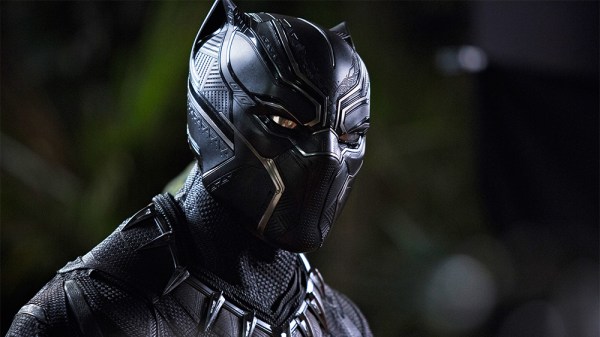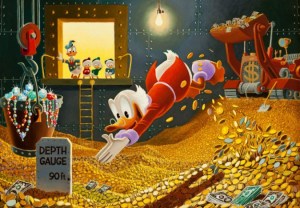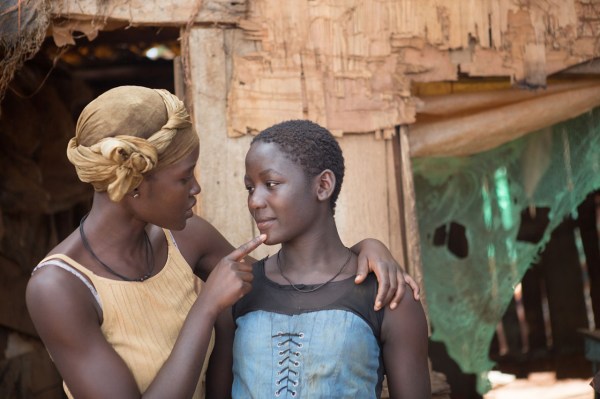“Why is nice Jordan Peele making such scary movies?”
As is often the case, Jay’s question is one that I can’t answer. But f you thought Get Out was too much, like Jay did, you will want to skip Us altogether. Maybe see Captain Marvel again while you wait for Dumbo, because Peele has clearly decided he’s made us giggle enough and now his goal is to induce heart attacks instead of belly laughs.
And yet, I still have to tell you to see it, even though you will kind of hate every minute. Us is just too good to miss. Like Get Out, there is a lot going on under the surface of Us, and like Get Out, it works as a thriller so if you want, you can ignore all the subtext and just enjoy the ride, or cringe in terror until the ride ends. In Us’ case, the ride is both metaphorically and literally a hall of mirrors, as a vacationing family is forced to face off against their evil twins. It’s like goateed Spock four times over, only in Us it is clear that the family from the mirror universe is out for blood and won’t stop til they get it.
Peele writes, directs and produces here, and in his sophomore outing as director he has already proven to be a monumental talent. He doesn’t appear as an actor but he’s imparted many of his mannerisms to Winston Duke, the family’s easygoing dad who seems more than anything is excited to get out on a rented motorboat that hangs slightly left. Duke provides a welcome dose of comic relief even as he does whatever is necessary to protect his family. He is equal to Lupita Nyong’o, and that’s the best anyone can ever do, because she brings it every time. Shahadi Wright Joseph and Evan Alex, as their kids, are both great as well. It’s awesome seeing them work together to survive as the stakes get raised higher and higher by the minute. Even more impressively, those four, and almost everyone in the movie, play dual roles, and there’s not a weak link to be found.
Us is one of those rare movies that stands above by being better executed, more thoughtful, and shamelessly cleverer than the rest of its genre. And like Get Out before it, Us is not a typical Oscar contender but it better get some attention next February. Because Peele and company deserve to be praised for what they’ve given us with Us: a brilliant film that manages to be brutal and restrained, and one that 24 hours later I still haven’t fully digested or shaken.

 The Marvel Cinematic Universe is so bloated at this point that Marvel usually crams as many superheroes as possible into the “solo” movies in between Avengers instalments. For example, Iron Man pops up in
The Marvel Cinematic Universe is so bloated at this point that Marvel usually crams as many superheroes as possible into the “solo” movies in between Avengers instalments. For example, Iron Man pops up in  ess the same movie. Clearly, that’s Marvel’s goal with a shared universe as that way, we movie-loving rubes have to see them all, and throw even more cash into Disney’s money bin (which by now must be bigger than Scrooge McDuck’s).
ess the same movie. Clearly, that’s Marvel’s goal with a shared universe as that way, we movie-loving rubes have to see them all, and throw even more cash into Disney’s money bin (which by now must be bigger than Scrooge McDuck’s). ty disputes in Black Panther are resolved through lots of punching and kicking (which, for all its flaws, is clearly a more efficient political system than the one the USA is currently using).
ty disputes in Black Panther are resolved through lots of punching and kicking (which, for all its flaws, is clearly a more efficient political system than the one the USA is currently using). Africa. The whole point of this film is rooted in poverty. A chess club is started in Katwe because of poverty – because mothers are too afraid of medical expenses should a child break a bone during soccer. So a board game is just more appealing. One of the big draws in getting the children to come in and learn the game is that the chess is served up with a free cup of porridge.
Africa. The whole point of this film is rooted in poverty. A chess club is started in Katwe because of poverty – because mothers are too afraid of medical expenses should a child break a bone during soccer. So a board game is just more appealing. One of the big draws in getting the children to come in and learn the game is that the chess is served up with a free cup of porridge. enough to represent Uganda internationally. As she begins to win, and to travel, she glimpses the life that could be hers if her chess game complies. But now that she’s playing not just to win, but to change her life, and support her family, it’s a lot of extra pressure any little girl’s shoulders.
enough to represent Uganda internationally. As she begins to win, and to travel, she glimpses the life that could be hers if her chess game complies. But now that she’s playing not just to win, but to change her life, and support her family, it’s a lot of extra pressure any little girl’s shoulders.